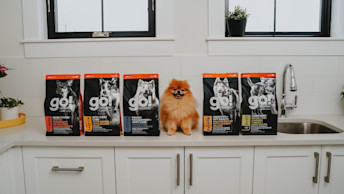November 9, 2022
Benefits of Grain-Free and Grain-Inclusive Dog Food Recipes

With so many premium dog food options available it can be hard to know how to choose the right one for your dog. One of the most common questions from dog owners is whether to go with a grain-free or grain-inclusive formula – which is best for your dog?
Grain-Inclusive
Let’s start off by going over some of the most commonly used grains in pet food.
These grains include:
- Wheat
- Corn
- Rice
- Oats
- Barley
- Rye
- Millet
Grains are an important source of complex carbohydrates – more slowly digested compared to simple carbohydrates. Although carbohydrates are not considered essential nutrients, they play a critical role in your pet’s body. Carbohydrates are a highly digestible, readily available energy source.
Grains in particular are a good source of:
- Fibre
- Protein
- Vitamins
- Minerals
You can find grains included in all of our Go! Solutions Skin + Coat Care and Go! Solutions Digestion + Gut Health recipes for dogs.

Grain-Free
Now, what about grain-free recipes? Grain-free are not carb-free and not the same as gluten-free recipes. Many grain-free pet foods are higher in protein than their grain-inclusive counterparts.
Grain-free doesn't always mean reduced carbohydrates - often, but not always. All foods contain a balance of carbohydrates, fat, and protein – decreasing the amount of carbohydrates in food will increase fat, protein, or both.
For example, our Go! Solutions Carnivore recipes are our lowest carbohydrate recipes formulated to be grain-free and have up to 97% of protein from premium-quality animal sources.
When a food doesn’t contain grains, it will use non-grain carbohydrates sources such as:
- Tapioca
- Potatoes
- Or pulse ingredients like lentils, peas, or chickpeas
Some pets have food sensitivities and may be intolerant to one or more specific grains. For these pets Go! Solutions Sensitivities Limited Ingredient recipes may be a good option.
In Conclusion
So, to grain or not to grain? Overall, there is no “right” choice – only the best choice for you and your dog. Both grain-free and grain-inclusive ingredients offer many health benefits and can be used to make a safe, healthy, balanced, and complete diet. The most important consideration in choosing a high-quality dog food is that it provides complete and balanced nutrition and is the best fit for your dog.




